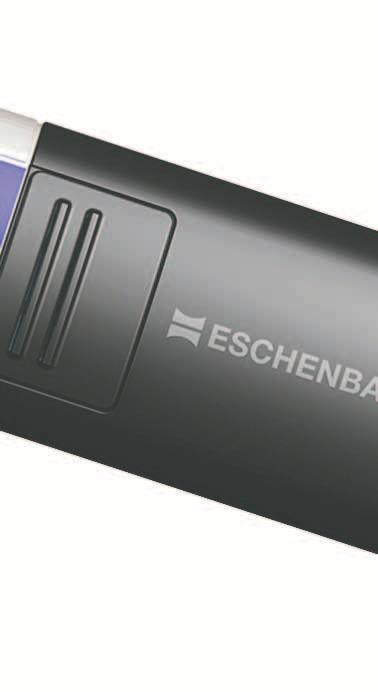
7 minute read
TECHNOLOGY
Innovations Technology &
Surveillance products grow in popularity
By Matt O’Brien
From the face scanner that checked in some attendees to the cameras-everywhere array of digital products, this year’s Consumer Electronics Show (CES) in Las Vegas was all-in on surveillance technology — whether it called it that or not.
Nestled in the “smart home” and “smart city” showrooms at the sprawling consumer tech conference were devices that see, hear and track the people they encounter. Some of them also analyze their looks and behavior.
The technology on display included eyelid-tracking car dashboard cameras to prevent distracted driving and “rapid DNA” kits for identifying a person from a cheek swab sample.
The new talking speakers, doorbell cameras and fitness trackers come with the promise of making life easier or more fun, but they’re also potentially powerful spying tools. And the skeptics who raise privacy and security concerns can be easily drowned out in the flashy spectacle of geewhiz technology.
The annual showcase, which took place in early January, is where big companies and startups unveil and promote their latest gadgets, many of them infused with microphones, cameras and artificial intelligence. Though weighted toward the consumer market, much of what was on display may also be useful to law enforcement, not to mention prying employers or government agencies.
Growing appetite for surveillance There’s been some push back, at least on facial recognition and other surveillance technology from China.
Hikvision and iFlytek, two Chinese tech companies that showed off their artificial intelligence at CES 2019, now face U.S. export restrictions because the Trump administration says the technology has been used in the repression of China’s Muslims. But China isn’t the only place where the lines have blurred between consumer technology and government surveillance operations.
Watchful residents of American neighborhoods are increasingly encouraged by Ring, Amazon’s security camera division, to share their doorbell video footage with police detectives.
Ring recently had to defend its safety
practices following reports of hackers breaking into their camera systems and harassing children. It’s also faced criticism from privacy advocates and U.S. lawmakers over its growing partnerships with police.
At CES, the company announced a new “control center” for camera owners to adjust their privacy settings and opt out of police requests for footage.
Still, device-makers seem to be counting on consumers buying into ever-more elaborate forms of surveillance and other artificial intelligence (AI) technology for peace of mind.
Camera-maker Arlo recently launched its first wireless floodlight camera — with night vision, a siren, two-way audio to converse with intruders and an ambient light sensor to automatically adjust its brightness.
Another company, Sunflower Labs, showed off its “home drone security” system. If trespassers step onto your lawn, a cameraequipped drone flies out from its resting place to take a look at them and streams the live video to your phone.
Privacy laws haven’t caught up
Serious talk about privacy protections and regulations wasn’t completely absent at CES. The schedule included panel talks connecting policymakers with privacy executives from companies like Apple and Facebook.
Venture capitalist Rajeev Chand, who moderated one of those panels, said tech companies are getting better at seeing themselves as custodians, not owners, of user data, but much more needs to be done. “We are probably at the first or second inning for how privacy re-shapes the consumer tech industry,” said Chand, a partner and head of research at Wing Venture Capital.
But even as some U.S. policymakers seek to restrict or ban facial recognition, the conference is getting its attendees more accustomed to everyday uses of surveillance technology in commercial and security settings. Attendees at the gadget show were able to use their face to pick up their event badges for the first time. “We’re experimenting with it,” said Gary Shapiro, CEO of the Consumer Technology Association, which organized CES.
He dismissed privacy concerns, saying that attendees have a choice. “You’re opting in,” he said. “If you want to do it, you’ll have an opportunity to do it.” —AP

The Consumer Electronics Show (CES) took place in early January, when tech companies brought their best and brightest new inventions to Las Vegas. Here are some intriguing new products from the annual show:
Want privacy? Just ask for it Google is adding a privacy “undo” feature to its Google Assistant voice technology.
Just tell Assistant to disregard something if you happen to notice the device was listening when it wasn’t supposed to. By saying, “Hey Google, that wasn’t for you,’’ Assistant will delete whatever you just said.
Another new feature will let you use your voice to ask Google about your own privacy settings.
The new features supplement privacy controls Google rolled out last year to let people delete their voice recording histories with voice commands. That came after revelations that Google and other companies were using human transcribers rather than just machines to listen to some audio recordings.
Water me!
Not all of us can tell when a plant needs more water, more light or less heat.
For that, Luxembourg startup Mu Design has created the Lua smart plant pot to give greenery an animated face. Emotions, such as thirsty, sick or cold, are displayed on a digital screen.




“It transforms the needs of the plant into emotion that you can easily understand, so you won’t be able to kill your plants,” said Vivien Muller from Mu Design. “You just have to look at it, and you’ll know exactly what it needs.”
An accompanying app lets users generate information specific to that plant. The pot itself is fitted with sensors to monitor moisture, light and temperature. The device is expected to ship this month for $110.
More mobile bodies
Companies are also trying to improve the mobility of your own body. Samsung showed off an exoskeleton system called GEMS, or Gait Enhancing & Motivating System. It uses small motors connected to your hips or knees to help you lift your limbs and complete exercises.
The company envisions GEMS will be helpful for people with limited mobility and those in physical therapy or rehab from surgery. But GEMS is still early in development and doesn’t yet have a release date.
Meanwhile, Startup Unlimited Tomorrow has designed a prosthetic arm created with a 3D printer. The arm senses grip and is Internet-connected for regular, personalized software updates. Those updates help fine-tune grip and movement for each person. The arm goes on sale later this year for about $5,000. —AP
★ FREE INFORMATION ★ FREE INFORMATION ★ FREE INFORMATION ★ FREE INFORMATION ★ FREE INFORMATION ★ FREE INFORMATION ★ FREE INFORMATION ★ FREE INFORMATION ★ FREE INFORMATION ★ FREE INFORMATION ★ FREE INFORMATION ★ FREE INFORMATION ★ FREE INFORMATION ★ FREE INFORMATION Name________________________________________________________________ _____________ Address__________________________________________________________________________ City_________________________________________State__________Zip____________________ Phone (day)_____________________________(evening)_____________________________ E-mail________________________________________________________________ _____________ Check the boxes you’re interested in and return this form to: The Beacon, P.O. Box 2227, Silver Spring, MD 20915 or fax to (410) 248-9102. BB3/20 ✃ MAIL OR FAX FOR FREE INFORMATION For free materials on housing communities and health studies, just complete and clip this coupon and mail or fax it to the Beacon. Housing Communities ❏ Blair House at Stoneleigh (see ad on page 25) ❏ Charlestown (see ad on page 15) ❏ Christ Church Harbor Apts. (see ad on page 26) ❏ Oak Crest (see ad on page 15) ❏ Park View Laurel (see ad on page 19) ❏ Park View Towson (see ad on page 19) ❏ Park View Fullerton (see ad on page 19) ❏ Park View Rosedale (see ad on page 19) ❏ St. Mary’s Roland View Towers (see ad on page 25) ❏ Warren Place Senior Apartments (see ad on page 16) Health Study Volunteers ❏ Balance & Falls Study (see ad on page 14) ❏ Calorie Restriction Study (see ad on page 13) ❏ Dental Health Study (see ad on page 12) ❏ Knee Osteoarthritis Study (see ad on page 14) ❏ Memory Study (see ad on page 14) ❏ Neuropathy (NiRiD) Study (see ad on page 12) ❏ STEP-HI Hip Fracture Study (see article on page 12) ❏ Stroke Study (see ad on page 13)


